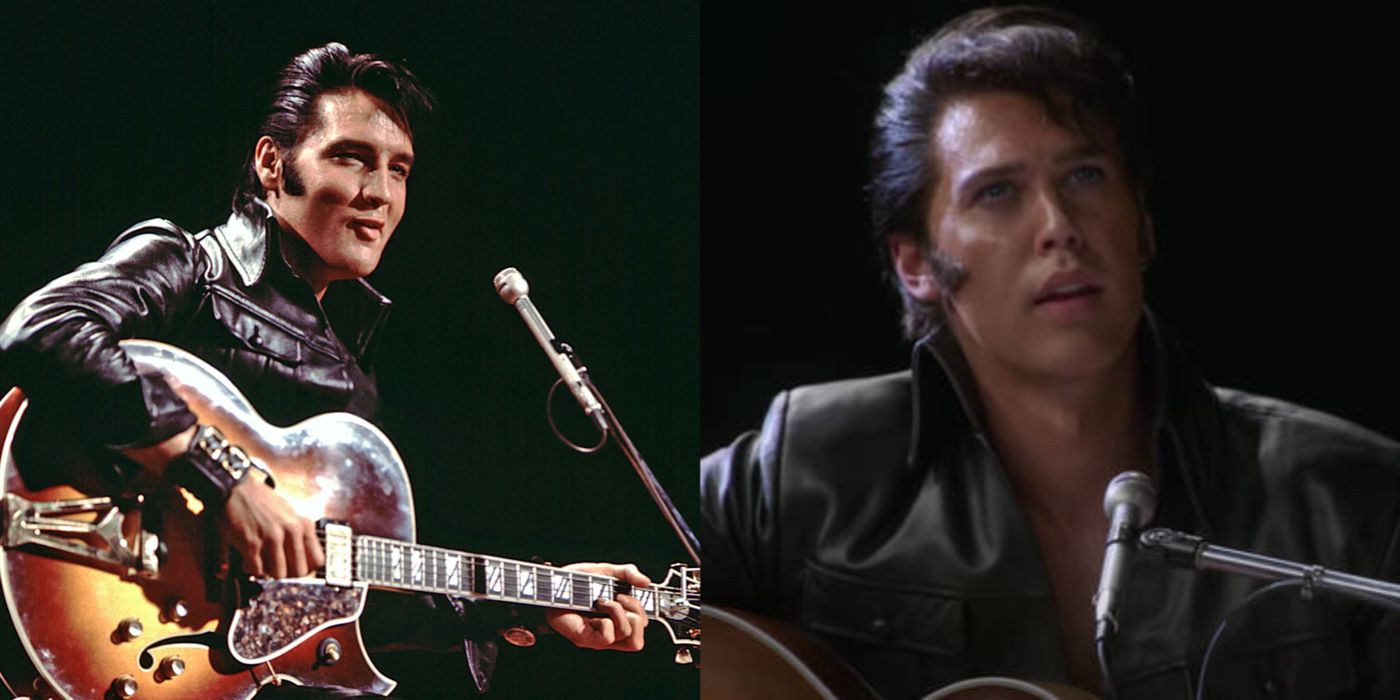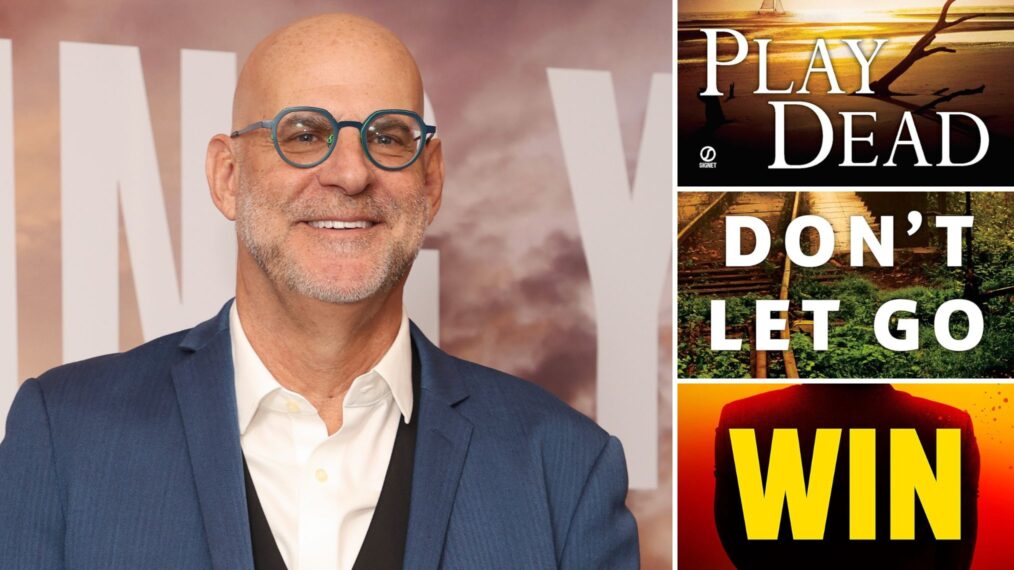Baz Luhrmann’s Elvis biopic continues the famous director’s style of glitzy, glittering portrayals of famous stories, such as Romeo and Juliet and The Great Gatsby. The life and career of the legendary musician, Elvis Presley, is the latest to get its own creative spin by Luhrmann.
Grappling with the mythology of one of the most famous artists who ever lived in under 3 hours requires directors to use a creative license in order to tell the story the way they want. This also applied to Luhrmann’s new movie too, as there are certain events that unfolded on screen that didn’t happen in real life or were slightly altered to fit his narrative.
Elvis Never Fired Colonel Tom Parker On Stage
In the film, after years of deceit, control, and financial troubles, Elvis fires his manager, Colonel Tom Parker. Even worse, he lets him go while on stage performing in Las Vegas, where he held a residency at the encouragement of Parker.
According to the movie, one factor that pushed Elvis over the edge is Parker lying about being a U.S. citizen. However, music journalist and Elvis expert, Alanna Nash, disputes this fact, claiming that Parker’s Dutch nationality was not revealed until after Presley’s death (via USA Today). Elvis, did, however, fire Parker after the singer got into a dispute with Hilton Hotel owner, Barron Hilton, who terminated a contract of an employee that forbade them from speaking to Elvis. This, however, was brief and occurred backstage rather than on stage.
Colonel Tom Parker Did Not Speak Like Tom Hanks
Tom Hanks’ performance as Colonel Tom Parker has been met with a mixed reception by critics and moviegoers, with many citing the performance as over-the-top, in particular noting the unusual Dutch accent Hanks uses (via Variety).
It is true that Colonel Parker was born in the Netherlands, but footage and audio of the real Parker display a much more American accent. Parker’s speaking voice was likely chosen behind-the-scenes of Elvis by Hanks to fit his interpretation. Hanks’ portrayal is of a larger-than-life character known for his many quirks, and ultimately, his deceits, particularly lying about his American citizenship. An exaggerated accent likely fits the idea of Parker more than the reality.
Elvis Did Not Wear A Lightning Bolt Necklace As A Child
In flashbacks to his childhood, Elvis portrays young Presley reading Captain Marvel Jr (later named Shazam!). Infatuated with the comic book imagery, he fashions himself a lightning symbol necklace similar to the superhero. Elvis expert Billy Stallings, however, disputes this ever happened as there is no evidence of the necklace (via Express).
There is plenty of similarity to the hero, however, in Elvis’ future signature costumes, with his love of bright colors, capes, and lightning bolt details on his jewelry. Stallings claimed that it is likely that this fabrication was created by Baz Luhrmann to help illustrate how he became a type of hero for his fans, while others believe the exposure to comic books in his humble beginnings helped shape his aspirations.
A Riot Did Not Break Out After Elvis Disobeyed Colonel Parker
Elvis follows in the footsteps of several Oscar-winning music biopics in taking inspiration from actual events and using creative license. While Presley’s performances did cause riots (most famously in Jacksonville, Florida when he was chased by fans – as floridahistorynetwork.com reports), no specific riot occurred after the singer ignored Parker’s command not to do any of his suggestive dance moves (via Variety).
Because Elvis’ dynamic dance moves were unlike anything that had been seen in mainstream media at that point in history, the singer’s stage presence was seen as rather scandalous for its time. Presley “disobeying” orders and starting a riot symbolizes what made Elvis a legendary part of pop culture.
Robert F. Kennedy Did Not Die While Elvis Was Performing
Elvis’ portrayal of the real-life musician does not take the same linear structure as history. The film depicts the assassination of Democratic presidential candidate Robert F. Kennedy on June 6th, 1968, as occurring at the same time as Elvis’ famous 1968 comeback special. However, the special was taped on June 27th.
The events are likely intersected in the film because the assassinations of Kennedy and Martin Luther King Jr. in 1968 were a tumultuous time in American culture. Presley was affected emotionally by the events, and it informed his performance, prompting the singer to pen “If I Can Dream” in their memory (via Vanity Fair).
Elvis Was Not In Danger Of Being Sent to Prison For His Dance Moves
Elvis makes it known that his rather sexual style of dancing was considered immoral by many. In the film, Presley is shown wiggling his finger to mock a judge who told him to refrain his moves, as well as being spied on by police. However, there is no evidence of any plans to arrest Elvis for gyrating, nor was he faced with either “army or jail” (via Yahoo)
Rather, it was a marketing technique for Elvis by Colonel Parker. Portraying Presley as the bad boy ingenue of rock music that pushes the limits of social convention makes the singer all the more appealing and easier to monetize. While it is certainly a fabrication that Elvis was in danger of serving hard time, it was a fabrication Parker participated in.
Elvis and Priscilla’s Relationship Is Portrayed as More Wholesome Than It Actually Was
Elvis Presley’s marriage to Priscilla Presley complicates his legacy, as the pair met when Priscilla was 14 years old and Elvis was 24. The film does not directly address the inappropriateness of this relationship and rather skirts around the subject. Priscilla’s parents are said to be upset about Elvis’ interest in their daughter, but no specifics are given as to why.
According to an article written by Priscilla in 1985, the relationship was much darker than what was portrayed on screen. Priscilla claims that he frequently supplied her with drugs and “molded” her into a woman while still attending school (via People). While Priscilla recalls their time together fondly as well as the film (via People), there is a clear disconnection between the portrayals to help audiences find their relationship easier to stomach.
Elvis Was Likely Not Friends With The Black Musicians He Is Portrayed To Be Friends With On Screen
One thing Elvis got right about his life is that he was heavily influenced by Black music and culture. Many of his biggest songs were originally written and recorded by Black artists (for example, Hound Dog was originally by Big Mama Thornton). Many founders of Rock ‘n’ Roll make an appearance in the movie, including Thornton, Sister Rosetta Sharpe, and B.B King, who is shown to be a friend and confidant to Presley.
In real life, however, this claim has been disputed. “Elvis and B.B. were acquaintances, but not close friends,” Elvis author Alanna Nash believes, adding that they merely “crossed paths briefly” (via USA Today). While they may not have been friends in reality, Luhrmann probably exaggerated their relationship to highlight how closely Elvis was inspired lack music.
It is Unknown if Elvis Took Up A Vegas Residency to Pay Colonel Parker’s Gambling Debts
The Las Vegas years in Elvis are portrayed as prison-like for the singer, where he is seemingly trapped in a residency at the International Hotel due to his managers gambling debts at its casino. While it is true that Colonel Parker was a prolific gambler, racking up over a million a year in winnings, there is no evidence of Parker’s debts to the hotel, particularly as he gambled in various locations across the nation (via USA Today).
It is likely that the movie exaggerates gambling as an easy example 0f Parker’s hold on Presley. Elvis famously didn’t perform internationally due to his manager’s legal troubles, and Vegas was arguably his best platform to perform. The Vegas setting also works as a display of Elvis’ own spiraling behavior, as well as the glitz and glamour that is prevalent throughout his career.
Elvis Was Not The Highest Paid Actor of His Time
Elvis is told through the narrative of Colonel Tom Parker as he reflects on the life of the man he used to mentor and eventually outlived. In informing audiences of the legacy of the King of Rock ‘n’ Roll and his hold on history, Parker claims Presley was the highest-paid actor of his time, as well as being the most popular actor of his time.
It is true that Elvis was paid a substantial $1 Million for Harum Scarum in 1965, but Marlon Brando was already being offered $1.25 million in 1962 for Mutiny On The Bounty (via Guinness World Records), shattering Elvis’ chance of holding the record. Statistically speaking, this is blatantly untrue, but audiences can maybe forgive Parker as an unreliable narrator given his record of lying and deceit.
About The Author



























































